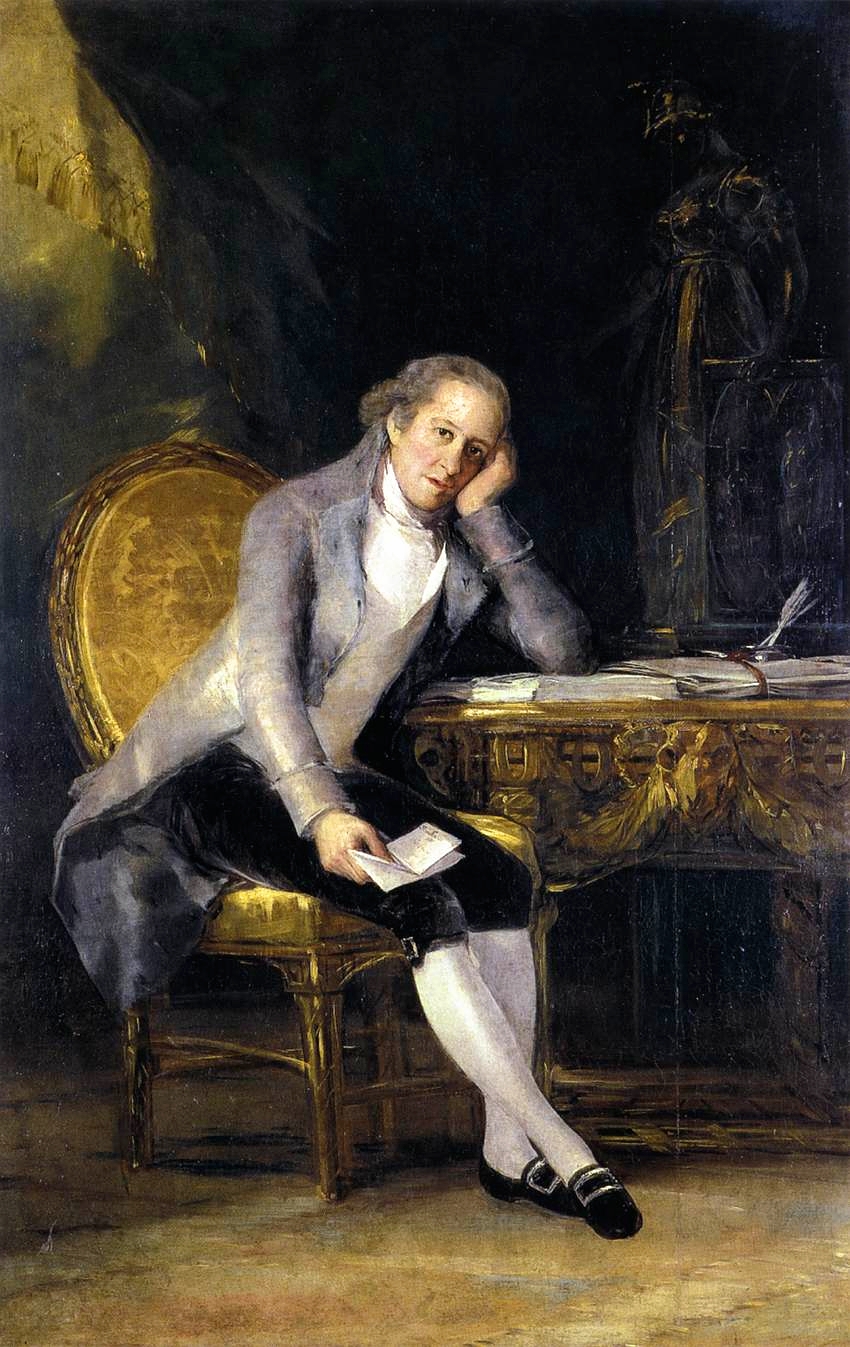- Gaspar Melchor de Jovellanos
Infobox Person
name =Gaspar Melchor de Jovellanos
image_size =250px
caption =Jovellanos painted byGoya
birth_date =birth date|1744|1|5|df=y
birth_place =Gijón ,Asturias ,Spain
death_date =death date|1811|11|27|df=y
death_place =
occupation =Author, Philosopher
spouse =
parents =
children =Gaspar Melchor de Jovellanos (
5 January ,1744 -27 November ,1811 ), Spanish neoclassical statesman, author, philosopher and main figure of theAge of Enlightenment in Spain, was born atGijón inAsturias ,Spain . Selecting law as his profession, he studied atOviedo ,Ávila , and theUniversity of Alcalá , before becoming a criminal judge atSeville in 1767.His integrity and ability were rewarded in 1778 by a judgeship in
Madrid , and in 1780 by appointment to the council of military orders. In the capital Jovellanos took a good place in the literary and scientific societies; he was commissioned by the Society of Friends of the Country (Madrid's economic society) in 1787 to write his most valuable work, "Informe en el expediente de ley agraria", a project which he completed in 1794, and published in 1795.Involved in the disgrace of his friend, Francisco de Cabarrús, Jovellanos spent the years 1790 to 1797 in a sort of banishment at Gijon, engaged in literary work and in founding the Asturian institution for agricultural, industrial, social and educational reform throughout his native province. This institution continued his darling project up to the latest hours of his life.
Summoned again to public life in 1797, Jovellanos refused the post of ambassador to
Russia , but accepted that of minister of grace and justice, under "the prince of the peace," whose attention had been directed to him by Cabarrus, then a favorite of Godoy. Displeased with Godoy's policy and conduct Jovellanos combined with his colleague Saavedra to procure his dismissal. Godoy returned to power in 1798; Jovellanos was again sent to Gijon, but in 1801 was thrown into prison inBellver Castle (Majorca ). ThePeninsular War , and the advance of the French into Spain, set him once more at liberty.Joseph Bonaparte , on mounting the Spanish throne, made Jovellanos the most brilliant offers; but the latter, sternly refusing them all, joined the patriotic party, became a member of the central junta, and contributed to reorganize the cortes. This accomplished, the junta at once fell under suspicion, and Jovellanos was involved in its fall. To expose the conduct of the cortes, and to defend the junta and himself were the last labors of his pen. In 1811 he was enthusiastically welcomed to Gijon; but the approach of the French drove him forth again. The vessel in which he sailed was compelled by stress of weather to put in at Vega de Navia (now Puerto de Vega) in Asturias, and there he died on November 27 1811.The poetical works of Jovellanos comprise a
tragedy "Pelayo", thecomedy "El delincuente honrado",satire s, and miscellaneous pieces, including a translation of the first book of "Paradise Lost ". His prose works, especially those on political and legislative economy, constitute his real title to literary fame. In them depth of thought and clear-sighted sagacity are couched in a certainCicero nian elegance and classical purity of style. Besides the "Ley agraria" he wrote "Elogios"; various political and other essays.References
*1911
Further reading
* Polt, John Herman Richard. "Gaspar Melchor De Jovellanos". New York: Twayne Publishers, 1971.Persondata
NAME= Jovellanos, Gaspar Melchor de
ALTERNATIVE NAMES=
SHORT DESCRIPTION=Author, Philosopher
DATE OF BIRTH=5 January ,1744
PLACE OF BIRTH=Gijón ,Asturias ,Spain
DATE OF DEATH=27 November ,1811
PLACE OF DEATH=
Wikimedia Foundation. 2010.
